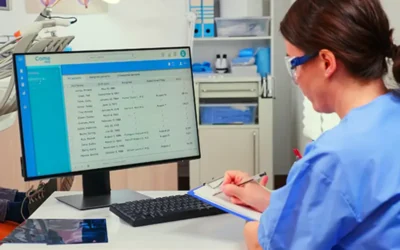Glomerulonephritis (GN) is a chronic kidney disease (CKD) characterized by inflammation of the glomeruli – the tiny filters in the kidneys that filter waste and excess fluids. The excess fluid and waste that glomeruli remove from the bloodstream exit the body as urine. This condition can occur suddenly (acute) or gradually (chronic), often leading to severe complications, including chronic kidney disease, acute kidney failure, high blood pressure and nephrotic syndrome if not managed properly. For healthcare providers, medical coding for glomerulonephritis—particularly, assigning the appropriate ICD-10 codes—is essential for ensuring accurate diagnosis reporting, proper reimbursement, and compliance with nephrology billing guidelines.
With clear, detailed documentation, a skilled HIPAA-compliant coding company can ensure correct code selection to minimize denials and optimize revenue.
The exact cause of glomerulonephritis is not known. The condition occurs on its own or as part of another disease, such as lupus or diabetes. Severe or prolonged inflammation associated with glomerulonephritis can damage the kidneys. In certain cases, the disease runs in families that can lead to inflammation of the glomeruli like infections, autoimmune diseases, vasculitis, sclerotic conditions and other related causes.
Understanding the Symptoms
Signs and symptoms of glomerulonephritis may vary depending on whether you have the acute or chronic form and the cause. In certain cases, this chronic disease may have no symptoms at all. Common symptoms include – urinating less than usual, pink or cola-colored urine from red blood cells in your urine (hematuria), foamy or bubbly urine (due to excess protein in the urine), hypertension, fluid retention (edema) with swelling evident in your face, hands, feet and abdomen, nausea and vomiting, muscle cramps and fatigue.
Struggling with Complex Nephrology Billing and Coding?
ICD-10 Codes for Glomerulonephritis
In many cases this kidney disease is diagnosed during a routine wellness visit or an appointment for managing a chronic disease, such as diabetes. Nephrologists will recommend several tests such as urine tests, blood tests, imaging tests (like X-ray, an ultrasound exam or a CT scan) and kidney biopsy to assess your kidney function. Treatment for this condition may depend on the type of kidney disease (acute or severe), severity of symptoms and the underlying causes. Dialysis or kidney transplant is the recommended treatment for this condition. ICD-10 coding for glomerulonephritis diagnosis depends on both the type and underlying cause of the condition.
N00 Acute nephritic syndrome
- N00.0 Acute nephritic syndrome with minor glomerular abnormality
- N00.1 Acute nephritic syndrome with focal and segmental glomerular lesions
- N00.2 Acute nephritic syndrome with diffuse membranous glomerulonephritis
- N00.3 Acute nephritic syndrome with diffuse mesangial proliferative glomerulonephritis
- N00.4 Acute nephritic syndrome with diffuse endocapillary proliferative glomerulonephritis
- N00.5 Acute nephritic syndrome with diffuse mesangiocapillary glomerulonephritis
- N00.6 Acute nephritic syndrome with dense deposit disease
- N00.7 Acute nephritic syndrome with diffuse crescentic glomerulonephritis
- N00.8 Acute nephritic syndrome with other morphologic changes
- N00.9 Acute nephritic syndrome with unspecified morphologic changes
- N00.A Acute nephritic syndrome with C3 glomerulonephritis
CPT Codes
- 81001 Urinalysis, automated with microscopy
- 81002 Urinalysis, non-automated, without microscopy
- 81003 Urinalysis, automated, without microscopy
- 81015 Microscopic exam of urine sediment
- 82570 Urine protein electrophoresis
- 50200 Percutaneous kidney biopsy, needle
- 50205 Open kidney biopsy
- 90935 Hemodialysis, single session
- 90937 Hemodialysis, repeated sessions
- 90945 Peritoneal dialysis
CKD Documentation Guidelines
Proper documentation is essential for accurate diagnosis, treatment, medical coding, and reimbursement. Effective documentation ensures compliance with regulatory requirements, improves patient outcomes, and minimizes claim denials in medical billing. Below are the essential documentation guidelines for healthcare providers when diagnosing and treating glomerulonephritis.
Specificity of Diagnosis: Medical documentation should clearly specify the type and severity of glomerulonephritis. Key details include:
- Type of GN – Acute, chronic, rapidly progressive, or recurrent
- Cause (if known) – Autoimmune (e.g. lupus nephritis), post-infectious, IgA nephropathy, or secondary to another condition
- Stage and Severity – Presence of complications such as chronic kidney disease (CKD), nephrotic syndrome, or renal failure
- Laterality (if applicable) – If one kidney is more affected than the other
Clinical Findings and Symptoms: Accurate documentation should include patient symptoms and physical findings, such as: Hematuria (blood in urine), Proteinuria (excess protein in urine), Edema (swelling, often in the legs or face), Hypertension (high blood pressure), Fatigue and general weakness and changes in urine output. Accurate documentation is crucial when coding complications of glomerulonephritis, as it helps ensure proper code assignment for associated conditions such as hypertension, nephrotic syndrome, or CKD.
Diagnostic Tests and Findings: The documentation should list all tests performed and their results, including:
- Urinalysis – Presence of red blood cells, white blood cells, protein, and casts
- Blood Tests – Serum creatinine, blood urea nitrogen (BUN), glomerular filtration rate (GFR), and complement levels
- Kidney Biopsy – If performed, include histopathological findings
- Imaging Studies – Ultrasound or CT scan findings related to kidney function
Treatment Plan: The medical record should include the treatment approach, such as:
- Medications – Corticosteroids, immunosuppressants, ACE inhibitors, diuretics
- Dialysis (if needed) – Type and frequency of dialysis
- Lifestyle Modifications – Dietary restrictions, fluid management, and blood pressure control
- Follow-up Plan – Monitoring kidney function, repeat testing, and long-term management strategies
ICD-10 and CPT Coding: To ensure proper billing and reimbursement, documentation should support the use of appropriate ICD-10 and CPT codes for glomerulonephritis. The ICD-10 code should be as specific as possible based on the clinical documentation.
Compliance with Medical Billing and Coding Standards: To ensure compliance:
- Use clear, concise, and legible documentation.
- Avoid vague terms like “kidney disease” without specifying type or severity.
- Link the diagnosis to symptoms and test results.
- Ensure that documentation supports medical necessity for tests and treatments.
Accurate glomerulonephritis coding is necessary to prevent denials and ensure proper reimbursement. Outsourcing medical billing and coding to an expert is the best option to ensure best practices for coding nephrology diagnoses. Partnering with RCM experts ensures accurate coding and efficient claim processing, helping to maximize financial performance and enhance overall healthcare management.
Ensure Accurate Medical Coding for Glomerulonephritis!




